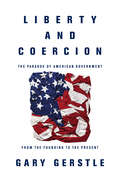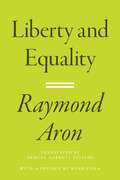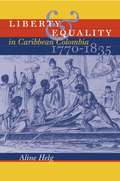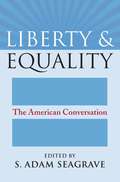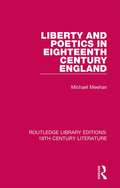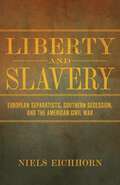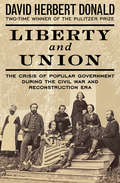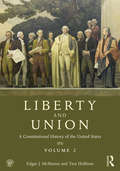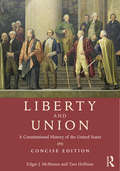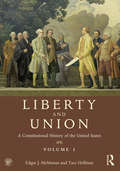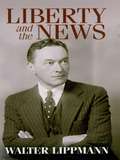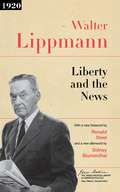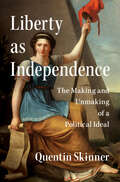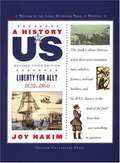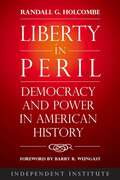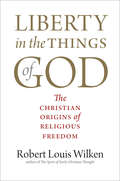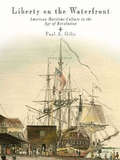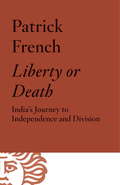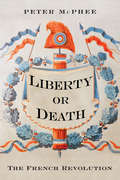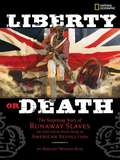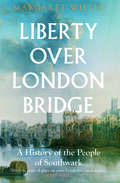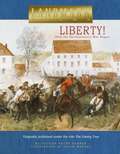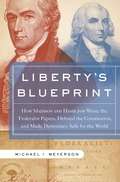- Table View
- List View
Liberty and Coercion
by Gary GerstleAmerican governance is burdened by a paradox. On the one hand, Americans don't want "big government" meddling in their lives; on the other hand, they have repeatedly enlisted governmental help to impose their views regarding marriage, abortion, religion, and schooling on their neighbors. These contradictory stances on the role of public power have paralyzed policymaking and generated rancorous disputes about government's legitimate scope. How did we reach this political impasse? Historian Gary Gerstle, looking at two hundred years of U.S. history, argues that the roots of the current crisis lie in two contrasting theories of power that the Framers inscribed in the Constitution. One theory shaped the federal government, setting limits on its power in order to protect personal liberty. Another theory molded the states, authorizing them to go to extraordinary lengths, even to the point of violating individual rights, to advance the "good and welfare of the commonwealth." The Framers believed these theories could coexist comfortably, but conflict between the two has largely defined American history. Gerstle shows how national political leaders improvised brilliantly to stretch the power of the federal government beyond where it was meant to go--but at the cost of giving private interests and state governments too much sway over public policy. The states could be innovative, too. More impressive was their staying power. Only in the 1960s did the federal government, impelled by the Cold War and civil rights movement, definitively assert its primacy. But as the power of the central state expanded, its constitutional authority did not keep pace. Conservatives rebelled, making the battle over government's proper dominion the defining issue of our time. From the Revolution to the Tea Party, and the Bill of Rights to the national security state, Liberty and Coercion is a revelatory account of the making and unmaking of government in America.
Liberty and Equality
by Raymond AronAn invaluable reflection on the essence of liberal democracy—and an ideal introduction to the work of political philosopher Raymond AronLiberty and Equality is the first English translation of the last lecture delivered at the Collège de France by Raymond Aron, one of the most influential political and social thinkers of the twentieth century. In this important work, the most prominent French liberal intellectual of the Cold War era presents his views on the core values of liberal democracy: liberty and equality. At the same time, he provides an ideal introduction to key aspects of his thought.Ranging from Soviet ideology to Watergate, Aron reflects on root concepts of democracy and representative government, articulates a notion of liberty or freedom as equal right as distinct from equal outcome, and discusses different kinds of liberties: personal, political, religious, and social. In search of a common truth or at least a common good, and analyzing what he perceives as the crisis of liberal democracies, Aron opens a space for reexamining the relation between liberty and equality.
Liberty and Equality in Caribbean Colombia, 1770-1835
by Aline HelgAfter Brazil and the United States, Colombia has the third-largest population of African-descended peoples in the Western hemisphere. Yet the country is commonly viewed as a nation of Andeans, whites, and mestizos (peoples of mixed Spanish and indigenous Indian ancestry). Aline Helg examines the historical roots of Colombia's treatment and neglect of its Afro-Caribbean identity within the comparative perspective of the Americas. Concentrating on the Caribbean region, she explores the role of free and enslaved peoples of full and mixed African ancestry, elite whites, and Indians in the late colonial period and in the processes of independence and early nation building.Why did race not become an organizational category in Caribbean Colombia as it did in several other societies with significant African-descended populations? Helg argues that divisions within the lower and upper classes, silence on the issue of race, and Afro-Colombians' preference for individual, local, and transient forms of resistance resulted in particular spheres of popular autonomy but prevented the development of an Afro-Caribbean identity in the region and a cohesive challenge to Andean Colombia.Considering cities such as Cartagena and Santa Marta, the rural communities along the Magdalena River, and the vast uncontrolled frontiers, Helg illuminates an understudied Latin American region and reintegrates Colombia into the history of the Caribbean.
Liberty and Equality: The American Conversation
by S. Adam SeagraveAlexis de Tocqueville, one of the greatest commentators on the American political tradition, viewed it through the lens of two related ideas: liberty and equality. These ideas, so eloquently framed by Thomas Jefferson in the Declaration of Independence, have remained inextricably and uniquely conjoined in American political thought: equality is understood as the equal possession of natural rights to life, liberty, and the pursuit of happiness. By considering American reflections on these core ideas over time--in relation to constitutional principles, religion, and race--this volume provides an especially insightful perspective for understanding our political tradition. The book is at once a summary of American history told through ideas and an inquiry into the ideas of liberty and equality through the lens of American history. <p> To a remarkable extent, American politics has always been thoughtful and American thought has always been political. In these pages, we see how some of our greatest minds have grappled with the issues of liberty and equality: Tocqueville and Jefferson, Alexander Hamilton as Publius in The Federalist, James Madison, George Washington, William Lloyd Garrison, Frederick Douglass, Abraham Lincoln debating Stephen Douglas, and Franklin D. Roosevelt. In essays responding to these primary sources, some of today's finest scholars take up topics critical to the American experiment in liberal democracy--political inequality, federalism, the separation of powers, the relationship between religion and politics, the history of slavery and the legacy of racism. Together these essays and sources help to clarify the character, content, and significance of American political thought taken as a whole. They illuminate and continue the conversation that has animated and distinguished the American political tradition from the beginning--and, hopefully, better equip readers to contribute to that conversation.
Liberty and Poetics in Eighteenth Century England (Routledge Library Editions: 18th Century Literature)
by Michael MeehanThe qualities and achievements of eighteenth century English literature have suffered denigration as a result of a prevailing Whig interpretation of literary history. It is the contention of this book, originally published in 1986, that an alternative form of Whig interpretation is possible and even desirable. It has as its sphere of interest the ways in which views on the nature and benefits of political freedom, and various "whiggish" readings of literary history, political theory and aesthetics, did in fact shape literary and social changes through the eighteenth century. Many characteristic Romantic tenets can be seen as springing, not fully formed from the heads of their creators, but directly out of the aesthetic concerns focusing around Longinus, and the recognition of the historically singular nature of the British constitution. This book studies and analyses the forms such concerns took in several of the central thinkers and writers of the period, and is an important contribution to the understanding of the eighteenth century milieu.
Liberty and Slavery: European Separatists, Southern Secession, and the American Civil War (Conflicting Worlds: New Dimensions of the American Civil War)
by Niels EichhornIn Liberty and Slavery, Niels Eichhorn examines the language of slavery, which he considers central to revolutionary struggles, especially those waged in Europe in the nineteenth century. Eichhorn begins in 1830 with separatist movements in Greece, Belgium, and Poland, which laid the foundation for rebellions undertaken later in the century, and then shifts focus to the 1848 uprisings in Ireland, Hungary, and Schleswig-Holstein. He argues that revolutionaries embraced or rejected the language of slavery as they saw fit, using it to justify their rebellions and larger goals. The failure of these insurgencies propelled a wave of revolutionary migrants across the Atlantic world. Those who journeyed to the United States felt the need to adjust to the political and sectional divisions in their new home. Eichhorn shows that separatism was widespread during this period; the secessionist aims of the American Confederacy were by no means unique. Additionally, Eichhorn explores these migrants’ motivations for shunning the Confederacy during the American Civil War. Having been steeped in the language of slavery and separatism, they naturally sided with the Union when the sectional crisis culminated in civil war in 1861.
Liberty and Union
by David Herbert DonaldThe two-time Pulitzer Prize winner&’s penetrating analysis of the crisis of democracy during the Civil War and Reconstruction eras. In Liberty and Union, David Herbert Donald persuasively examines one of the most tumultuous periods in American history. With the same wit, eloquence, and willingness to question received wisdom that define his acclaimed biographies of Abraham Lincoln and Charles Sumner, Donald suggests that it was the commonalities between North and South—and not their differences—that led to the earth-shattering conflict that was the Civil War and defined the chaotic years that followed. Exploring the political, social, and economic impact of the war, emancipation, Reconstruction, and westward expansion, Donald combines history and philosophy, offering a bold and thought-provoking analysis that goes far in explaining the nation we live in today. Riveting, illuminating, and provocative, Liberty and Union sheds a brilliant light on a half-century of US history and addresses a perennial problem of democratic societies all over the world: how to reconcile majority rule and minority rights.
Liberty and Union: A Constitutional History of the United States, Volume 2
by Edgar J. McManus Tara HelfmanThis, the second of two volumes of Liberty and Union, is a comprehensive constitutional history of the United States from the Progressive Era of the early twentieth century to the most recent decisions of the Supreme Court on contemporary constitutional issues. Written in a clear and engaging narrative style, it successfully unites thorough chronological coverage with a thematic approach, offering critical analysis of core constitutional history topics, set in the political, social, and economic context that made them constitutional issues in the first place. Combining a thoughtful and balanced narrative with an authoritative stance on key issues, the authors deliberately explain the past in the light of the past, without imposing upon it the standards of later generations. Authored by two experienced professors in the field, this textbook has been thoughtfully constructed to offer an accessible alternative to dense scholarly works – avoiding unnecessary technical jargon, defining legal terms and historical personalities where appropriate, and making explicit connections between constitutional themes and historical events. For students in an undergraduate or postgraduate constitutional history course, or anyone with a general interest in constitutional developments, this book will be essential reading. Useful features include: Full glossary of legal terminology Recommended reading A table of cases Extracts from primary documents Companion website Useful documents provided: Declaration of Independence Articles of Confederation Constitution of the United States of America Chronological list of Supreme Court justices
Liberty and Union: A Constitutional History of the United States, concise edition
by Edgar J. McManus Tara HelfmanThis, the concise edition of Liberty and Union, is an abridged constitutional history of the United States, designed for short single-semester courses, comprising the key topics from Volumes 1 and 2. Written in a clear and engaging narrative style, it successfully unites thorough chronological coverage with a thematic approach, offering critical analysis of core constitutional history topics, set in the political, social, and economic context that made them constitutional issues in the first place. Combining a thoughtful and balanced narrative with an authoritative stance on key issues, the authors deliberately explain the past in the light of the past, without imposing upon it the standards of later generations. Authored by two experienced professors in the field, this concise edition presents seminal topics while retaining the narrative flow of the two full original volumes. An accessible alternative to dense scholarly works, this textbook avoids unnecessary technical jargon, defines legal terms and historical personalities where appropriate, and makes explicit connections between constitutional themes and historical events. For students in a short undergraduate or postgraduate constitutional history course, or anyone with a general interest in constitutional developments, this book will be essential reading. Useful features include: Full glossary of legal terminology Recommended reading A table of cases Extracts from primary documents Companion website Useful documents provided: Declaration of Independence Articles of Confederation Constitution of the United States of America Chronological list of Supreme Court justices
Liberty and Union: A Constitutional History of the United States, volume 1
by Edgar J. McManus Tara HelfmanThis, the first of two volumes of Liberty and Union, is a comprehensive constitutional history of the United States from the Anglo-American origins of the Constitution through the colonial and antebellum periods, to the Civil War and the consequent restructuring of the nation. Written in a clear and engaging narrative style, it successfully unites thorough chronological coverage with a thematic approach, offering critical analysis of core constitutional history topics, set in the political, social, and economic context that made them constitutional issues in the first place. Combining a thoughtful and balanced narrative with an authoritative stance on key issues, the authors explain the past in the light of the past, without imposing upon it the standards of later generations. Authored by two experienced professors of History and Law this textbook has been thoughtfully constructed to offer an accessible alternative to dense scholarly works – avoiding unnecessary technical jargon, defining legal terms and historical personalities where appropriate, and making explicit connections between constitutional themes and historical events. For students in an undergraduate or postgraduate constitutional history course, or anyone with a general interest in constitutional developments, this book will be essential reading. Useful features include: Full glossary of legal terminology Recommended reading A table of cases Extensive supporting artwork Companion website Useful documents provided: Declaration of Independence Articles of Confederation Constitution of the United States of America Chronological list of Supreme Court justices
Liberty and the News
by Walter Lippmann Robert McchesneyWritten in the aftermath of World War I, this polemic by the Pulitzer Prize-winning journalist exposes the threat to democracy posed by media bias. Walter Lippmann denounces the wartime misinformation and propaganda fed to the public by the press, calling for an honest, "spin-free" interpretation of facts and ideas. Written in an accessible rather than a scholarly style, this treatise consists of three essays that examine the tenuous relationship between facts and news and the consequences of media distortion. Its conclusions helped establish the standards of objective reporting that were subsequently embraced by reputable news-gathering agencies. Walter Lippmann was the United States's most respected political journalist for nearly fifty years. Although this volume was first published nearly a century ago, it remains relevant to those seeking sound information as the basis for informed judgments. This edition includes "A Test of the News" by Walter Lippmann and Charles Merz, and a Preface by Robert McChesney is included as well.
Liberty and the News (The James Madison Library in American Politics)
by Walter LippmannLiberty and the News is Walter Lippman's classic account of how the press threatens democracy whenever it has an agenda other than the free flow of ideas. Arguing that there is a necessary connection between liberty and truth, Lippman excoriates the press, claiming that it exists primarily for its own purposes and agendas and only incidentally to promote the honest interplay of facts and ideas. In response, Lippman sought to imagine a better way of cultivating the news. A brilliant essay on a persistent problem of American democracy, Liberty and the News is still powerfully relevant despite the development of countless news sources unimagined when Lippman first published it in 1920. The problems he identifies--the self-importance of the press, the corrosion of rumors and innuendo, and the spinning of the news by political powers--are still with us, and they still threaten liberty. By focusing on the direct and necessary connection between liberty and truth, Lippmann's work helps to clarify one of the most pressing predicaments of American democracy today.
Liberty as Independence: The Making and Unmaking of a Political Ideal
by Quentin SkinnerWhat does liberty entail? How have concepts of liberty changed over time? And what are the global consequences? This book surveys the history of rival views of liberty from antiquity to modern times. Quentin Skinner traces the understanding of liberty as independence from the classical ideal to early modern Britain, culminating in the claims of the Whig oligarchy to have transformed this idea into reality. Yet, with the Whig vision of a free state and civil society undermined by the American Revolution of 1776, Skinner explores how claims that liberty was fulfilled by an absence of physical or coercive restraint came to prominence. Liberty as Independence examines new dimensions of these rival views, considering the connections between debates on liberty and debates on slavery, and demonstrating how these ideas were harnessed in feminist discussions surrounding limitations on the liberty of women. The concept of liberty is inherently global, and Skinner argues strongly for the reinstatement of the understanding of liberty as independence.
Liberty for All? (A History of Us #5)
by Joy HakimEarly nineteenth-century America could just about be summed up by Henry David Thoreau's words when he said, "Eastward I go only by force, but westward I go free." It was an exuberant time for the diverse citizens of the United States, who included a range of folk, from mountain men and railroad builders to whalers and farmers, as they pushed forward into the open frontier and all their hopes and fears are captured in Liberty for All? In addition to colorful accounts of the massive westward migration, the California Gold Rush, a war with Mexico, the Oregon boundary conflict, Texas and the Alamo, Liberty for All? takes a deep look at the issue that began to gnaw at the country's core: How, in the land where "all men are created equal," could there be slaves? This text is listed as an example that meets Common Core Standards in English language arts in grades 4-5 at http://www.corestandards.org.]
Liberty in America, 1600 to the Present (Liberty in America, Volume #1)
by Oscar Handlin Lilian HandlinThis volume discusses the concept of liberty, what it meant in 1600, and what the concept developed into, up to the eve of the Revolution.
Liberty in Expansion: 1760-1850 (Liberty in America, Volume #2)
by Oscar Handlin Lilian HandlinVolume 2 of Liberty in America-- 1600 to the Present.
Liberty in Peril: Democracy and Power in American History
by Randall G. HolcombeWhen the United States was born in the revolutionary acts of 1776, Americans viewed the role of government as the protector of their individual rights. Thus, the fundamental principle underlying the new American government was liberty. Over time, the ideology of political &“democracy&”—the idea that the role of government is to carry out the &“will of the people,&” as revealed through majority rule—has displaced the ethics of liberty. This displacement has eroded individual rights systematically and that history is examined in Liberty in Peril by Randall Holcombe in language accessible to anyone.The Founders intended to design a government that would preclude tyranny and protect those individual rights, and the Bill of Rights was a clear statement of those rights. They well understood that the most serious threat to human rights and liberty is government. So, the Constitution clearly outlined a limited scope for government and set forth a form of governance that would preserve individual rights. The federal government&’s activities during two world wars and the Great Depression greatly increased government&’s involvement in people&’s lives. By the time of Lyndon Johnson&’s &“Great Society,&” the depletion of rights and the growth of the activities of political democracy was complete. By the end of the 20th Century the fundamental principle underlying the U.S. government was now political power and not liberty. Public policy was oriented toward fulfilling the majority rule with the subsequent increase in government power and scope. Holcombe argues that economic and political systems are not separate entities but are intimately intertwined. The result is a set of tensions between democracy, liberty, a market economy, and the institutions of a free society. All those interested in the evolution of American government, including historians, political scientists, economists, and legal experts, will find this book compelling and informative.
Liberty in the Things of God: The Christian Origins of Religious Freedom
by Robert Louis WilkenFrom one of the leading historians of Christianity comes this sweeping reassessment of religious freedom, from the church fathers to John Locke In the ancient world Christian apologists wrote in defense of their right to practice their faith in the cities of the Roman Empire. They argued that religious faith is an inward disposition of the mind and heart and cannot be coerced by external force, laying a foundation on which later generations would build. Chronicling the history of the struggle for religious freedom from the early Christian movement through the seventeenth century, Robert Louis Wilken shows that the origins of religious freedom and liberty of conscience are religious, not political, in origin. They took form before the Enlightenment through the labors of men and women of faith who believed there could be no justice in society without liberty in the things of God. This provocative book, drawing on writings from the early Church as well as the sixteenth and seventeenth centuries, reminds us of how “the meditations of the past were fitted to affairs of a later day.”
Liberty on the Waterfront
by Paul A. GiljeThrough careful research and colorful accounts, historian Paul A. Gilje discovers what liberty meant to an important group of common men in American society, those who lived and worked on the waterfront and aboard ships. In the process he reveals that the idealized vision of liberty associated with the Founding Fathers had a much more immediate and complex meaning than previously thought.In Liberty on the Waterfront: American Maritime Culture in the Age of Revolution, life aboard warships, merchantmen, and whalers, as well as the interactions of mariners and others on shore, is recreated in absorbing detail. Describing the important contributions of sailors to the resistance movement against Great Britain and their experiences during the Revolutionary War, Gilje demonstrates that, while sailors recognized the ideals of the Revolution, their idea of liberty was far more individual in nature--often expressed through hard drinking and womanizing or joining a ship of their choice.Gilje continues the story into the post-Revolutionary world highlighted by the Quasi War with France, the confrontation with the Barbary Pirates, and the War of 1812.
Liberty or Death: India's Journey to Independence and Division
by Patrick FrenchAt midnight on 14 August 1947, Britain's 350-year-old Indian Empire was broken into three pieces. The greatest mass migration in history began, as Muslims fled north and Hindus fled south, and Britain's role as an imperial power came to an end. <P> Patrick French's vivid and surprising account of the chaotic final years of colonial rule in India has been acclaimed as the definitive book on this subject. Journeying across India, Bangladesh, and Pakistan, he brings to life a cast of characters including spies, idealists freedom fighters, and politicians from Churchill to Gandhi. The result is a compelling story of deal-making, missed opportunities, hope, and tragedy.
Liberty or Death: The French Revolution
by Peter McPheeA strinking account of the impact of the French Revolution in Paris, across the French countryside, and around the globe The French Revolution has fascinated, perplexed, and inspired for more than two centuries. It was a seismic event that radically transformed France and launched shock waves across the world. In this provocative new history, Peter McPhee draws on a lifetime&’s study of eighteenth-century France and Europe to create an entirely fresh account of the world&’s first great modern revolution—its origins, drama, complexity, and significance. Was the Revolution a major turning point in French—even world—history, or was it instead a protracted period of violent upheaval and warfare that wrecked millions of lives? McPhee evaluates the Revolution within a genuinely global context: Europe, the Atlantic region, and even farther. He acknowledges the key revolutionary events that unfolded in Paris, yet also uncovers the varying experiences of French citizens outside the gates of the city: the provincial men and women whose daily lives were altered—or not—by developments in the capital. Enhanced with evocative stories of those who struggled to cope in unpredictable times, McPhee&’s deeply researched book investigates the changing personal, social, and cultural world of the eighteenth century. His startling conclusions redefine and illuminate both the experience and the legacy of France&’s transformative age of revolution. &“McPhee…skillfully and with consummate clarity recounts one of the most complex events in modern history…. [This] extraordinary work is destined to be the standard account of the French Revolution for years to come.&”—Publishers Weekly (starred review)
Liberty or Death: The Surprising Story of Runaway Slaves Who Sided with the British During the American Revolution
by Margaret Whitman BlairLiberty or Death is the little-known story of the American Revolution told from the perspectives of the African-American slaves who fought on the side of the British Royal Army in exchange for a promise of freedom. Motivated by the 1775 proclamation by Virginia’s Royal Governor that any slaves who took up arms on his behalf would be granted their freedom, these men fought bravely for a losing cause. Many of the volunteers succumbed to battle wounds or smallpox, which ran rampant on the British ships on which they were quartered. After the successful Revolution, they emigrated to Canada and, ultimately to West Africa. Liberty or Death is the inspiring story of the forgotten freedom fighters of America’s Revolutionary War.
Liberty over London Bridge: A History of the People of Southwark
by Margaret WillesThe first complete history of Southwark, London&’s stubbornly independent community over the Thames Southwark&’s fortunes have always been tied to those of the City of London across the river. But from its founding in Roman times through to flourishing in the medieval era, the Borough has always fiercely asserted its independence. A place of licence, largely free of the City&’s jurisdiction, Southwark became a constant thorn in London&’s side: an administrative anachronism, a commercial rival, and an asylum for undesirable industries and residents. In this remarkable history of London&’s liberty beyond the bridge, Margaret Willes narrates the life and times of the people of Southwark, capturing the Borough&’s anarchic spirit of revelry. Populated by a potent mix of talented immigrants, religious dissenters, theatrical folk, brewers, and sex workers, Southwark often escaped urban jurisdiction—giving it an atmosphere of danger, misrule, and artistic freedom. Tracing Southwark&’s history from its Roman foundation to its present popularity as a place to visit, through Chaucer, to Shakespeare, and on to Dickens, Willes offers an indispensable exploration of the City&’s unacknowledged mirror image.
Liberty! How the Revolutionary War Began
by Lucille Recht PennerHow the Revolutionary War Began. The American colonists were fed up with British law. They refused to buy English goods. They formed a militia of tradesmen and farmers ready to fight at a moment's notice. Most importantly, they joined together. All 13 colonies sent representatives to decide whether they should form a new country. That group wrote the Declaration of Independence, the document that summed up a revolution.
Liberty's Blueprint: How Madison and Hamilton Wrote the Federalist Papers, Defined the Constitution, and Made Democracy S
by Michael MeyersonAside from the Constitution itself, there is no more important document in American politics and law than the Federalist Papers--the series of pamphlets written by Alexander Hamilton and James Madison to explain the meaning of the proposed Constitution to the American people and persuade them of its importance. These papers provide a window into the framers' thoughts on the most divisive issues of American government--the powers of the President, the dividing line between Congress's authority and that of the states, the role of the Supreme Court, and the importance of the Bill of Rights. Liberty's Blueprint offers an essential introduction to how the Federalist Papers were written, the philosophical thinking that shaped the Constitution, how the framers meant the various clauses to be understood, and why they are still vitally important today.
